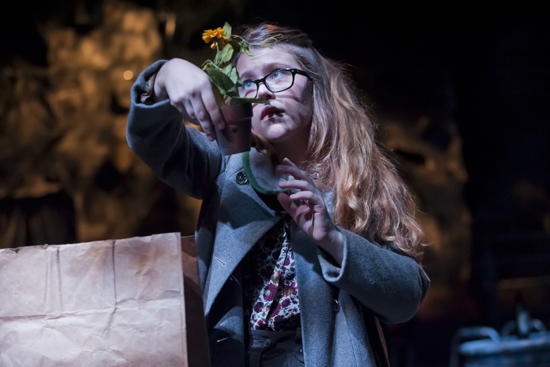Haunting Gamma Rays Kicks Off BCAP Season
Timeless Pulitzer-winning drama about a troubled family

Paula Langton (left), a CFA associate professor, plays the unstable widowed mother, Beatrice, in The Effect of Gamma Rays on Man-in-the Moon Marigolds. Photos by Kalman Zabarsky
The Effect of Gamma Rays on Man-in-the Moon Marigolds, a powerful, at times harrowing drama about a troubled family, kicks off the fifth season of the Boston Center for American Performance (BCAP), the professional arm of the College of Fine Arts School of Theatre. Winner of the 1971 Pulitzer Prize, Paul Zindel’s play is named for one of the characters’ school science project, which becomes a metaphor for survival and the tenacity of beauty and tenderness in a cruel world.
With characters that continue to haunt long after the final curtain, Gamma Rays is the story of teenage sisters Ruth and Matilda and their bitter, mentally unstable widowed mother, Beatrice, memorably portrayed by Joanne Woodward in the 1972 film version and played here by Paula Langton (CFA’03), a CFA associate professor and head of acting. The production runs through November 18 at the BU Theatre’s Lane-Comley Studio 210.
A play rich in compelling female roles, Gamma Rays seemed the perfect vehicle for Langton, says director Jim Petosa, a CFA professor and director of the School of Theatre. The play embodies the “poetic realism” that came out of the tradition of Tennessee Williams, Petosa notes. “It’s both real and poetic, and evokes in the audience a kind of wistfulness that can be individually processed. It will move people in different ways. But I think our job is to see that no one remains neutral.”

It’s hard to imagine anyone remaining neutral watching the tormented epileptic sister Ruth, played by Casey Tucker (CFA’14), venting her rage on the quiet Matilda (“Tilly”), portrayed with stirring innocence by Celia Pain (CFA’13). Lorne Batman (CFA’13) appears as the ailing, elderly Nanny, a boarder the financially strapped Beatrice cares for, grouses about, and ridicules as a “vegetable.” Progressing with ominous overtones, the play is punctuated by Beatrice’s poisonous pronouncements. “Jesus,” she asks her gentle younger daughter, “don’t you hate the world, Matilda?”
“The characters in this play are so beautifully, painfully human, flawed, and doing the best they can with what they have,” observes BCAP veteran Langton (The Glass Menagerie, A Question of Mercy). She relishes sharing the stage with her students. “I love how being in a play together evens the playing field,” she says. “We become fellow artists in the rehearsal room.”
Gamma Rays is part of CFA’s Keyword Initiative program, now in its second year. The 2012–21013 keyword is resilience, with the initiative focusing on the buoyancy of the human spirit in the face of adversity.
The Effect of Gamma Rays on Man-in-the-Moon Marigolds runs through November 18 at the Boston University Theatre, Lane-Comley Studio 210, 264 Huntington Ave., Boston. Performances are Wednesdays and Thursdays at 7:30 p.m., Fridays and Saturdays at 8 p.m., and Sundays at 2 p.m. Tickets are $20 general admission, $15 for students, senior citizens, and groups of 10 or more. Members of the BU community are eligible for one free ticket with BU ID, at the door, subject to availability. Tickets and further information are available here or by calling the box office at 617-933-8600. To get to the BU Theatre, take the MBTA Green Line E trolley to Symphony or the Orange Line to Massachusetts Avenue.
Comments & Discussion
Boston University moderates comments to facilitate an informed, substantive, civil conversation. Abusive, profane, self-promotional, misleading, incoherent or off-topic comments will be rejected. Moderators are staffed during regular business hours (EST) and can only accept comments written in English. Statistics or facts must include a citation or a link to the citation.